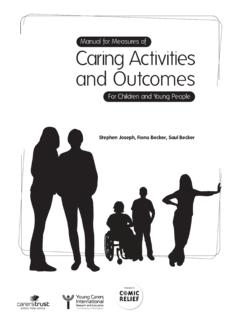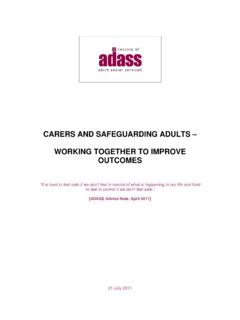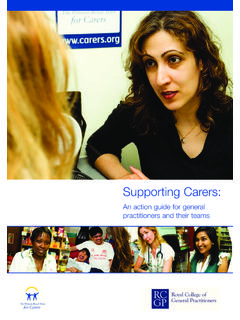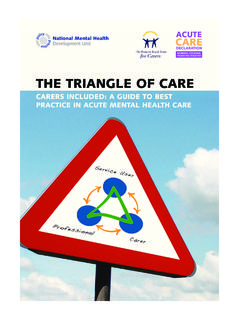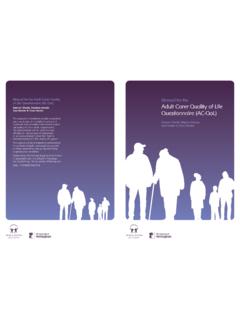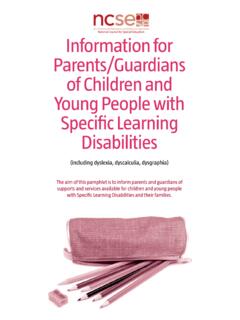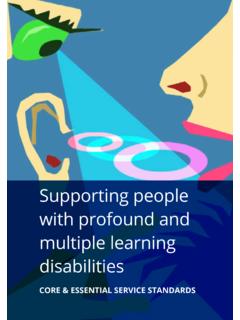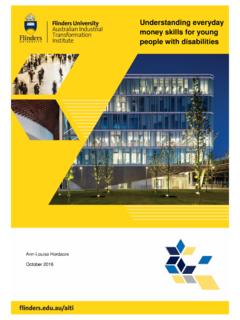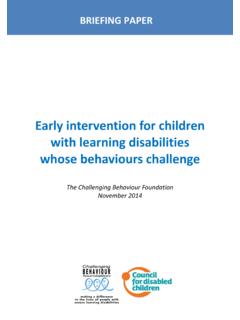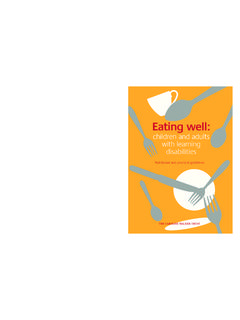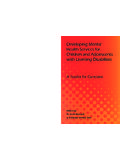Transcription of Supporting Family Carers of People with Learning …
1 05/10/2009 Supporting Family Carers of People with Learning disabilities Aim of this resource This resource has been put together to help workers and volunteers within The Princess Royal Trust for Carers and Crossroads Care s networks to continue to develop and provide the best possible information and support to Family Carers of People with Learning disabilities . It aims to: promote a shared understanding of some of the key issues that impact on Family Carers of People with Learning disabilities increase knowledge and understanding of some of the key policy messages of particular relevance to People with Learning disabilities and their families signpost People towards more information and resources around particular issues.
2 This resource does not contain everything about each topic. Instead it provides a snapshot of policy and information resources and is the start of a tool that can be grown. This resource has been produced by the Foundation for People with Learning disabilities and the Sharing Caring Project at Sheffield Mencap for The Princess Royal Trust for Carers and Crossroads Care. 05/10/2009 What s special about the needs of Family Carers of People with Learning disabilities ? Family Carers is the term used by Learning disability organisations and Carers themselves to refer to Carers of People with Learning disabilities .
3 The needs of all Family Carers of People with Learning disabilities are fundamentally the same as other carer groups. Key common issues for all Carers include: 1. Being RECOGNISED for the caring role that they are providing by professionals not just hands-on physical caring but all the emotional support, prompting and keeping People safe and happy generally 2. Getting hold of the right INFORMATION at the right time in a format that is accessible 3. Having the right SUPPORT for the person cared for and the rest of the Family something that is becoming increasingly difficult due to tightening eligibility criteria for services 4.
4 Having the opportunity to be INVOLVED in decision making about the things that affect themselves and their Family 5. Being able to have BREAKS from caring that suit the Family 6. Getting access to the right benefits and not being FINANCIALLY DISADVANTAGED because of caring 7. Being able to look after their own HEALTH and WELL-BEING An essential difference between many Family Carers of People with Learning disabilities and other carer groups is the lifetime experience of caring with different needs arising at different times. The majority of Family Carers are parents, although there are increasing numbers of siblings, grandparents and other relatives, partners and friends who are also caring.
5 Most of these Family Carers have been involved with the person since birth and their lives are usually centred on the needs of the person with the Learning disability. Sometimes it can be easy for People to make assumptions that the needs of all Family Carers are the same but this is clearly not true. Families often find themselves in situations where they appear to be focusing on the negatives rather than the positives. This is often misinterpreted by People working in services as obstructive and over-protective. However, Family Carers have often found their own ways of coping over many years. They can feel they are not listened to or have their experience recognised when they are trying to get the support their relative needs.
6 Whether speaking up in meetings, reviews or filling in paperwork, it can be exhausting and frustrating to be perceived as the person(s) who will always be negative when your intention is quite the opposite! 05/10/2009 Index 1. What is a Learning disability?.. 4 2. A brief overview of how People with Learning disabilities have been treated over the last 40 8 3. Supporting Family 10 a. Supporting Family Carers of People with Learning disabilities .. 10 b. Older families .. 16 c. Families from black and minority ethnic communities .. 19 d. Supporting Carers who have a Learning 21 4. Supporting children with Learning 23 5.
7 Transition and young 28 6. Adult 32 a. Citizenship .. 32 b. Getting the right 37 c. A safe life .. 43 d. A Healthy Life .. 46 e. A home of your own .. 50 f. Employment and 53 g. Day time activities, leisure, breaks and 56 h. Friendships and 59 7. Having a say in the development of 62 If reading this resource on a computer, please hold the ctrl key and left-click on any title above to be taken to the relevant section. 05/10/2009 1. What is a Learning disability? Many People find the term Learning disability to be confusing. Many different terms are also used, including mental handicap , developmental disability or Learning difficulty the latter is the term preferred by many self advocates.
8 Many older Family Carers will be able to give you a full list of terms, most of which are now considered extremely offensive, that have been used in the past by different professionals to describe their relatives disability. Learning disability is the term that the Department of Health now use within their policy and practice documents. In Valuing People (2001) they describe a Learning disability as a: significantly reduced ability to understand new or complex information, to learn new skills reduced ability to cope independently which starts before adulthood with lasting effects on development. A Learning disability is a lifetime impairment, usually from birth, that means a person is always likely to need some form of support with their daily life.
9 Learning disabilities are many and varied. Most People recognise some of the better known syndromes such as Down s syndrome, Rett syndrome and Fragile X, but there are lots more and some People never have a full diagnosis. Many People s Learning disability occurs from birth or a childhood illness, and many People with a diagnosis of having an Autistic Spectrum Disorder or Cerebral Palsy may also have a Learning disability, although this is not automatic. Some People s Learning disability may affect only some areas of their life and whilst they may have a job and a Family , they may still need help with tasks such as budgeting, filling in forms and cooking.
10 Other People s Learning disability may mean that they have extremely high individual support needs and they may need help with every aspect of their personal, health and social care. The fact that the term Learning disability can describe People with such extremely different needs is something that many People who don t have personal experience of Learning disability can struggle to understand. Between 1% and 2% of the population have a Learning disability. It is predicted that numbers are going to increase because People with Learning disabilities are living longer and more young People with complex needs are surviving childhood.


